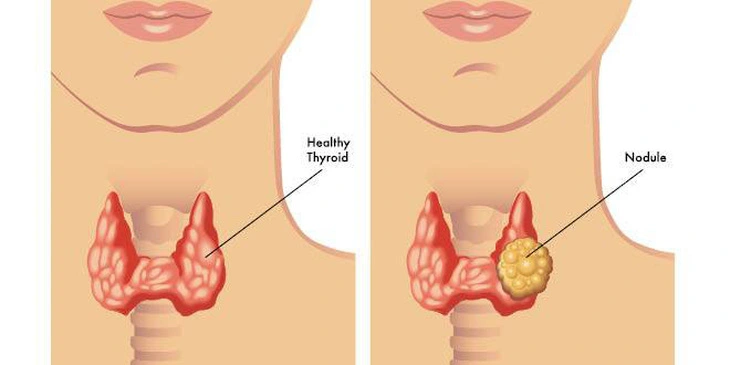Thyroid nodules are a condition in which the tissues in the thyroid gland develop abnormally, forming a mass of cells in the thyroid gland. The incidence of thyroid nodules is increasing, most of which are benign, not cancerous, and can be cured. However, even if the cell mass is benign, it can still cause certain dangers to the patient’s health. To better understand whether thyroid nodules are dangerous, the causes and symptoms of the disease, let’s find out through the article below!
What is a thyroid nodule?
The thyroid gland is an endocrine gland located in the middle of the front of the neck, shaped like a butterfly, consisting of two lobes connected by the thyroid isthmus. The thyroid gland has an important function, responsible for producing thyroid hormones to maintain many activities of the brain, heart, and other parts of the body. In addition, the thyroid gland also secretes the hormone calcitonin to participate in the process of regulating calcium levels in the blood.

Most thyroid nodules are benign, but they can still pose certain dangers to the patient.
Thyroid nodules are abnormal growths of thyroid tissue, forming one or more nodules in the thyroid gland. Thyroid nodules are a common disease, most of which are benign. However, when these cell masses grow to a large enough size, they can compress areas around the neck such as the trachea and esophagus, leading to difficulty breathing, difficulty swallowing, a feeling of obstruction in the neck, or creating a bulge in the neck that affects aesthetics.
Some common thyroid nodules are colloid nodules, thyroid cysts, inflammatory nodules, multinodular goiter, hyperthyroidism, or thyroid cancer.
Symptoms of thyroid nodules
Usually, thyroid nodules are often asymptomatic. Thyroid nodules are often detected after health check-ups or detected through imaging results performed for another reason. However, in some cases, thyroid nodules can cause the following symptoms:
- When the thyroid nodules are large enough, the patient will feel neck pain, difficulty breathing, difficulty swallowing, a feeling of obstruction in the throat or hoarseness due to compression of the trachea or esophagus.
- Thyroid nodules usually do not secrete hormones, but in some special cases, thyroid nodules can increase activity and secrete excessive hormones, which can cause hyperthyroidism and thyrotoxicosis. From there, the patient may experience some symptoms such as: hand tremors, rapid and irregular heartbeat, increased sweating, increased body temperature, nervousness, anxiety, insomnia, fatigue, muscle weakness, easy weight loss, etc.
- Sometimes, patients with thyroid nodules may experience symptoms such as neck, jaw or ear pain.
In a few cases, thyroid nodules can progress to cancer, most cases of thyroid cancer will develop slowly and when they are still small, the doctor can detect it.

When the thyroid nodule is large, it can cause pain, difficulty swallowing, and difficulty breathing.
Causes of thyroid nodules
Thyroid nodules can appear at any age and are most commonly found in women. Some opinions suggest that the appearance of thyroid nodules may be related to the anatomical structure of the female body, because they have to go through many milestones that change hormones such as puberty, menstruation, pregnancy, childbirth, breastfeeding, premenopause and menopause.
According to statistics, when reaching the age of 60, nearly half of the population has thyroid nodules, about 90% of which are benign thyroid nodules and about 5 – 10% of the remaining cases are malignant nodules.
The cause of most cases of thyroid nodules is not yet determined. Some causes that can lead to the development of nodules in the thyroid gland are as follows:
- Iodine deficiency may be a typical cause of thyroid nodules. It may be due to iodine deficiency in the daily diet. However, in reality, dietary iodine deficiency is not very common in many countries.
- Thyroid tissue grows excessively and uncontrolled, causing thyroid nodules. The reason for this development is still unclear. However, it is not cancerous and rarely causes too much of an impact unless the size of the thyroid nodule is large enough to compress surrounding areas.
- Some cases of thyroid nodules cause hyperthyroidism.
- Thyroid cysts can be the cause of thyroid nodules. Thyroid cysts are water-filled cavities that contain solid components mixed with water. Most cysts are not cancerous, but when they contain solid tissue inside the thyroid gland, they can develop into cancer.
- Chronic thyroiditis, also known as Hashimoto’s disease, is a thyroid disorder. The disease can cause thyroid inflammation and the formation of large nodules inside the thyroid gland, often accompanied by hypothyroidism.
- Multinodular goiter is a condition in which the thyroid gland contains multiple distinct masses.
- Thyroid cancer: This is the least risky form of thyroid nodule. Factors that increase the risk of thyroid cancer include a family history of thyroid cancer or endocrine disease, or a history of radiation exposure or exposure to chemicals that can cause mutations.
Are thyroid nodules dangerous?
Depending on the type of abnormally growing cells in the thyroid gland, thyroid nodules will be determined as benign (not cancerous) or malignant (thyroid cancer), single nodules or multiple nodules. Most cases of thyroid nodules are benign and do not change the structure or function of the thyroid gland.
However, in cases of hyperactive thyroid nodules, increased hormone production can lead to hyperthyroidism. Some rare cases can cause bleeding inside the thyroid cyst, causing symptoms of neck, jaw or ear pain.
Patients can rest assured that if the thyroid nodule is benign, proper treatment will stabilize the disease and not affect health. Although benign thyroid nodules are not harmful, when the size of the thyroid nodule is large enough, it will cause compression of the airway and esophagus, and can even compress the laryngeal nerve, causing hoarseness, thereby affecting the patient’s life and activities.

Is thyroid nodules dangerous?
According to studies, the incidence of thyroid cancer is not high, only about 4 – 5% of cases with thyroid nodules are malignant. In cases of malignant thyroid nodules, patients need to be treated promptly by specialists. If treated properly, thyroid cancer can be cured.
The histopathological characteristics of the thyroid gland are very diverse, to know if thyroid nodules are dangerous, a full examination and accurate diagnosis from specialists is required. Because the disease has almost no symptoms, in order to detect the disease early, you should have regular health check-ups to increase the rate of cure, thereby bringing a healthy and peaceful life.





